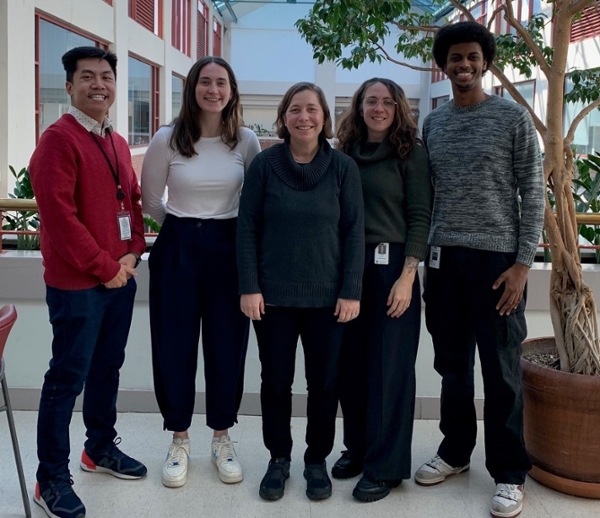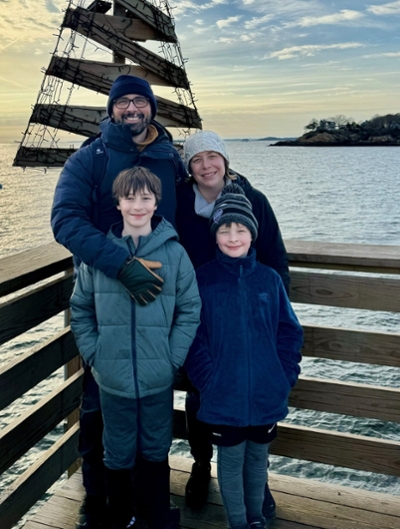Rachel S. Knipe, MD, ATSF
Assistant Professor of Medicine, Harvard Medical School
Assistant Physician, Massachusetts General Hospital
Principle Investigator, Center for Immunology, and Inflammatory Diseases, MGH
(Pictured at right, center, with her lab)

Three statements about you – two true, one false.
- I played lacrosse in high school.
- I worked as a camp counselor and swim instructor during many summers growing up.
- I have three older brothers.
Give us your ‘elevator pitch’ biography.
I am a physician scientist with a research program focused on the role of the pulmonary microvasculature in lung injury, repair, and fibrosis. I am particularly interested in how vascular injury leads to increased vascular permeability, both of which contribute to the development and progression of pulmonary fibrosis. I trained as a medicine resident at NYP-Cornell and then as a pulmonary and critical care fellow in the Harvard Combined program.
Since fellowship, I have been on faculty at MGH in the division of pulmonary and critical care medicine doing clinical work in the ICU and on the pulmonary consult service and working in the lab studying mechanisms of pulmonary fibrosis.
What would you tell yourself as an Early Career Professional?
There are so many stresses on early career professionals, it often felt to me like responsibilities were ramping up in many domains of my life at the same time during those years, starting out as a new attending physician, building a research path to independence at the same time as starting a family.
I think I would tell myself to take a deep breath and take things one day at a time. I think I would tell myself to look up, find people who seemed to have the career you want, and ask them how they did it.
Near-peer mentorship is so invaluable to finding your way. I am so grateful for so many people ahead of me who gave me advice and led by example.
If you weren’t in medicine, and were in a different industry altogether, what would you be?
This is actually a little hard to answer because I have found medicine to be a great mix of science and caring for people, and I like both aspects. I suppose I would have probably done something different with a similar mix, like teaching or coaching.
What is your favorite way to spend a day off?
I am not naturally an early morning person, so it would start with sleeping in late! And then getting outside to get some exercise, either going for a run or playing soccer or bike riding with my husband and two sons who are both super soccer fans.
What areas of medicine are you most excited to see develop?
I am most excited to see personalized medicine develop within the field of pulmonary medicine. In the way that oncology has developed personalized approaches to cancer over the last decade, I look forward to seeing pulmonary disease pathogenesis research open new avenues for personalized approaches to the treatment of lung disease, including pulmonary fibrotic diseases.
What is one advancement in your field you’d like to see in your career?
I would like to see the success of a novel antifibrotic therapy that reverses established fibrosis. Maybe that’s asking too much, but I am dreaming big! And of course, given my work with Dr. Andy Tager during my fellowship training, I would love to see successful translation of his work on LPA/LPA1 signaling into the clinic. There are some exciting trials currently enrolling, and I am eagerly awaiting those results.
Which statement did you make up?
The lie is (that I have) three older brothers. I actually have one younger sister!


